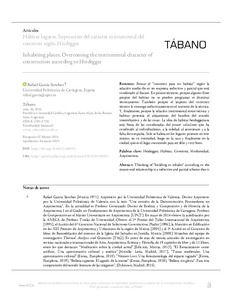Por favor, use este identificador para citar o enlazar este ítem:
https://repositorio.uca.edu.ar/handle/123456789/20089| Campo DC | Valor | Lengua/Idioma |
|---|---|---|
| dc.contributor.author | García Sánchez, Rafael | es |
| dc.date.accessioned | 2025-07-11T20:23:42Z | - |
| dc.date.available | 2025-07-11T20:23:42Z | - |
| dc.date.issued | 2025 | - |
| dc.identifier.issn | 2591-572X | - |
| dc.identifier.uri | https://repositorio.uca.edu.ar/handle/123456789/20089 | - |
| dc.description.abstract | Pensar el “construir para un habitar” según la relación medio-fin es un esquema reductivo y parcial que está condenado al fracaso. En primer término, porque algunos fines propios del habitar no se pueden programar ni dominar técnicamente. También porque el imperio del construir técnico lo sumerge reductivamente en el universo de la técnica. Y, finalmente, porque la relación instrumental entre técnica y habitar potencia el alejamiento del hombre del mundo intersubjetivo y de las cosas. La idea de habitar heideggeriana está fuera de las coordenadas del pensar calculante que ha conducido al individualismo, a la soledad, al anonimato y a la falta de compañía. Solo se habita en los lugares: primero en uno mismo, en su intimidad, luego en la casa y finalmente en la ciudad, que es el lugar construido para ser feliz y vivir bien | es |
| dc.description.abstract | Thinking of "building to inhabit" according to the means-end relationship is a reductive and partial scheme that is doomed to failure. In the first place, because some of the purposes of dwelling cannot be programmed or technically mastered. Also, because the empire of technical construction reductively submerges him in the universe of technique. And, finally, because the instrumental relationship between technique and inhabiting enhances man's distance from the intersubjective world and from things. Heidegger's idea of inhabiting is outside the coordinates of calculating thinkingthat has led to individualism, solitude, anonymity and lack of company. We only live in places: first in oneself, in one's intimacy, then in the house and finally in the city, which is the place built to be happy and live well. | es |
| dc.format | application/pdf | es |
| dc.language.iso | spa | es |
| dc.publisher | Pontificia Universidad Católica Argentina. Facultad de Filosofía y Letras. Centro de Estudiantes de Filosofía | es |
| dc.rights | Atribución-NoComercial-CompartirIgual 4.0 Internacional | * |
| dc.rights.uri | http://creativecommons.org/licenses/by-nc-sa/4.0/ | * |
| dc.source | Tábano. 2025, 26 | es |
| dc.subject | Heidegger, Martin, 1889-1976 | es |
| dc.subject | FILOSOFIA | es |
| dc.subject | ARQUITECTURA | es |
| dc.subject | MODERNIDAD | es |
| dc.title | Habitar lugares. Superación del carácter instrumental del construir según Heidegger | es |
| dc.title | Inhabiting places. Overcoming the instrumental character of construction according to Heidegger | es |
| dc.type | Artículo | es |
| dc.identifier.doi | 10.46553/tab6851 | - |
| uca.issnrd | 1 | es |
| uca.affiliation | Fil: García Sánchez, Rafael. Universidad Politécnica de Cartagena; España | es |
| uca.version | publishedVersion | es |
| item.languageiso639-1 | es | - |
| item.fulltext | With Fulltext | - |
| item.grantfulltext | open | - |
| Aparece en las colecciones: | TAB - 2025 nro. 26 | |
Ficheros en este ítem:
| Fichero | Descripción | Tamaño | Formato | |
|---|---|---|---|---|
| habitar-lugares-superacion.pdf | 341,6 kB | Adobe PDF |  Visualizar/Abrir |
Este ítem está sujeto a una Licencia Creative Commons

